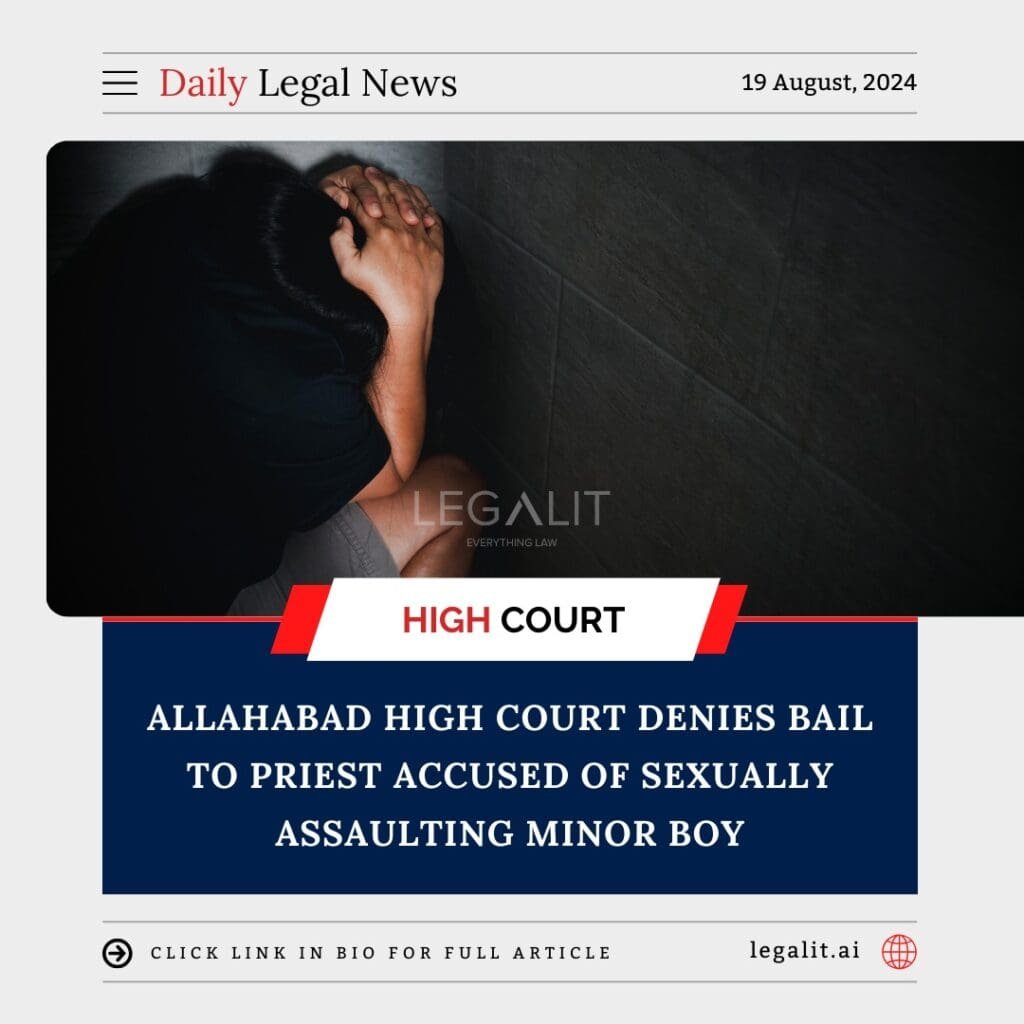
In a significant ruling, the Allahabad High Court has denied bail to a priest (pujari) accused of sexually assaulting a minor boy. The decision underscores the judiciary’s stringent approach to cases involving sexual offenses against minors, particularly when the accused holds a position of trust or authority, such as a religious figure.
Background of the Case
The case involves a priest who has been accused of sexually assaulting a minor boy, an offense that has not only legal but also deep moral and social implications. The incident reportedly took place in a religious setting, where the accused, by virtue of his role as a pujari, was in a position of authority and trust over the victim.
Sexual assault cases involving minors are prosecuted under the Protection of Children from Sexual Offences (POCSO) Act in India, a law that was specifically enacted to safeguard children from sexual abuse. The Act provides for stringent punishment and has special provisions to ensure the protection and care of the child victims throughout the legal process.
Given the gravity of the allegations, the accused sought bail, which led to the matter being brought before the Allahabad High Court.
Court’s Ruling
- Denial of Bail: The Allahabad High Court, after reviewing the case, denied the bail application of the priest. The Court likely took into account the serious nature of the offense, the position of trust held by the accused, and the potential impact on the victim and society at large.
- Seriousness of the Offense: The Court emphasized the seriousness of sexual offenses against minors, particularly when committed by individuals who are supposed to be protectors and guides, such as religious leaders. The denial of bail reflects the Court’s stance on ensuring that those accused of such heinous crimes are not allowed to evade the legal process.
- Potential for Evidence Tampering or Threat to Victim: In cases involving minors and sensitive crimes, courts often consider the possibility of the accused tampering with evidence or intimidating the victim if released on bail. This consideration likely played a role in the Court’s decision to deny bail.
- Upholding the Integrity of the Legal Process: By denying bail, the Court aimed to uphold the integrity of the legal process and ensure that justice is served, particularly in cases where vulnerable individuals, such as minors, are involved.
Implications of the Ruling
The Allahabad High Court’s decision to deny bail in this case carries several important implications:
- Message of Zero Tolerance: The ruling sends a strong message of zero tolerance for sexual offenses against minors, particularly those committed by individuals in positions of authority or trust. It reinforces the judiciary’s commitment to protecting children and upholding the rule of law.
- Protection of Victims: By denying bail, the Court ensures that the victim is protected from potential threats or intimidation. It also helps to maintain the integrity of the investigation and legal proceedings.
- Deterrence: The decision serves as a deterrent to others who might exploit positions of power to commit similar offenses. It underscores the fact that such crimes will be met with severe legal consequences.
- Public Trust in the Judicial System: The ruling is likely to bolster public trust in the judicial system, particularly in cases involving the protection of minors. It reassures the public that the courts are committed to delivering justice in a fair and timely manner.
Moving Forward
As the case proceeds, several steps are likely to follow:
- Continued Legal Proceedings: The case will continue to be heard in the lower courts, where the prosecution will present its evidence against the accused. The denial of bail means that the priest will remain in custody during the trial.
- Support for the Victim: It will be crucial for the authorities to provide continued support to the victim, ensuring their safety, mental health, and well-being throughout the legal process. This may involve counseling, protection services, and legal aid.
- Public and Media Attention: The case is likely to attract significant public and media attention, given the involvement of a religious figure and the serious nature of the allegations. This attention could influence broader discussions on the role of religious leaders and the need for accountability in all sectors of society.
- Judicial Precedent: The decision may set a judicial precedent for how similar cases are handled in the future, particularly concerning the denial of bail in cases involving sexual offenses against minors.
Conclusion
The Allahabad High Court’s denial of bail to the priest accused of sexually assaulting a minor boy reflects the judiciary’s firm stance on addressing sexual crimes against vulnerable individuals, especially when the accused holds a position of trust. The ruling reinforces the principle that justice must be served swiftly and without compromise in cases involving the safety and dignity of children. As the case progresses, it will continue to serve as a critical example of the legal system’s role in protecting the most vulnerable members of society and ensuring that perpetrators of such heinous crimes are held accountable.